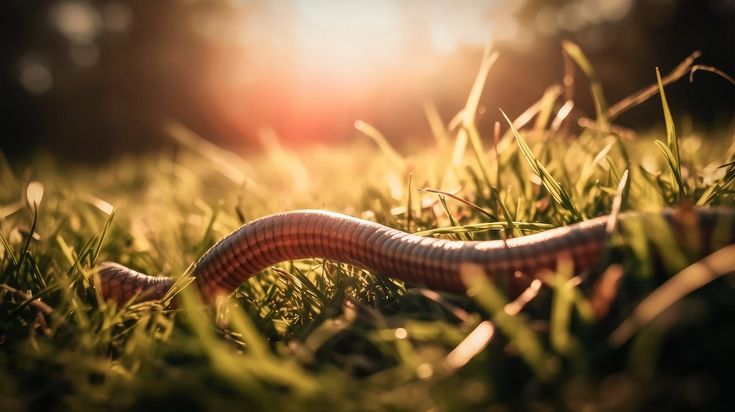14.02.2024 - Earthworms shy away from the limelight

(c) Pixabay
15 February is Earthworm Day. A study by the University of Natural Resources and Life Sciences, Vienna has now shown that earthworms also react to light pollution, i.e. artificial light at night: they are less active and at the same time the highly allergenic ragweed grows better. Until now, light pollution has mainly been discussed as a problem for insects or birds. The study has now been published in the journal BMC Ecology and Evolution.
In our cultivated landscape, only a few meadows and fields are completely dark at night. In addition to street lights, passing vehicles also bring light pollution into these ecosystems at night. While many other animals sleep, earthworms wriggle out of their burrows at night to search for small seeds or leaves on the soil surface. Charles Darwin observed back in the 19th century that although earthworms have no eyes, they are able to perceive light via special sensory cells.
Experimental research was conducted at the University of Natural Resources and Life Sciences, Vienna (BOKU) to determine the extent to which earthworms are affected by light pollution. For this purpose, worms (Lumbricus terrestris) were kept in plant pots that were either completely darkened overnight or exposed to weak street lighting. Seeds of ragweed (Ambrosia artemisiifolia), also known as ragweed, were also sown in the pots. T
The research question was to what extent light pollution influences the interaction between earthworms and ragweed, as earthworms also eat plant seeds and can change the germination conditions of plants. Ragweed was chosen as a test plant because it produces highly allergenic pollen, the spread of which is increasing rapidly due to climate change.
The results of the study were surprising in their clarity: compared to a dark night, the earthworms were 76% less active on the surface during light pollution Another interesting observation is described by study author Marion Mittmannsgruber: "Every now and then we were lucky enough to catch the earthworms mating in flagrante delicto. But these mating acts mainly took place in the dark, and not in light pollution".
As far as the germination of ragweed is concerned, this was also lower in the presence of light pollution. Despite the lower germination, the plants grew better under light pollution. Earthworms reduced germination because they ate ragweed seeds or transported the seeds to deeper soil layers where they could no longer germinate.
Study leader Johann Zaller summarises: "We were really surprised that this low level of light pollution - you could just read a newspaper in this light - had such a strong effect. It would now be exciting to investigate the long-term effects on earthworms, whether they are less likely to germinate. In any case, our investigations show another stressor of how ecological relationships are influenced by human activities."
Of course, the conclusion of the study is not that all streetlights should be switched off to avoid disturbing earthworms. But, there are many sources of man-made light pollution that could easily be dispensed with, for example when it comes to excessive lighting of gardens or side streets.
To the study:
The original study is available free of charge:
Mittmannsgruber M, Kavassilas Z, Spangl B, Gruber E, Jagg E, Zaller JG (2024)
Artificial light at night reduces earthworm activity but increases growth of invasive ragweed.
BMC Ecology and Evolution 24, 10.
https://doi.org/10.1186/s12862-024-02200-x
Scientific contact:
DI Marion Mittmannsgruber
Institute of Zoology
University of Natural Resources and Life Sciences, Vienna (BOKU)
E-mail: marion.mittmannsgruber(at)boku.ac.at
Assoc. Prof. Dr Johann Zaller
Institute of Zoology
University of Natural Resources and Life Sciences, Vienna (BOKU)
E-mail: johann.zaller(at)boku.ac.at
